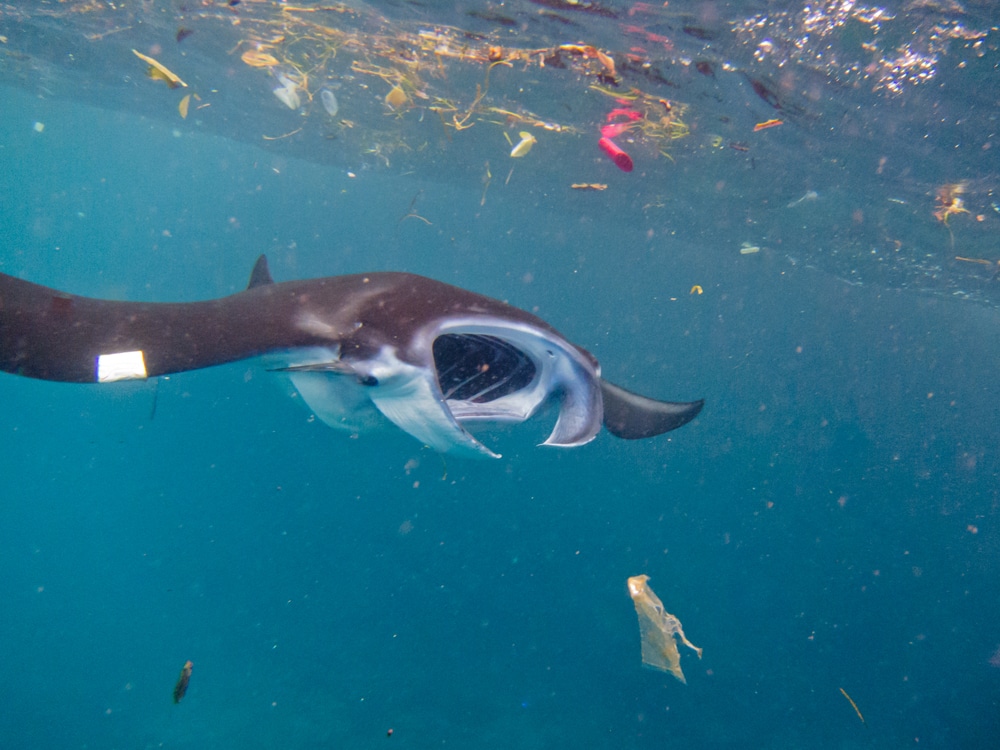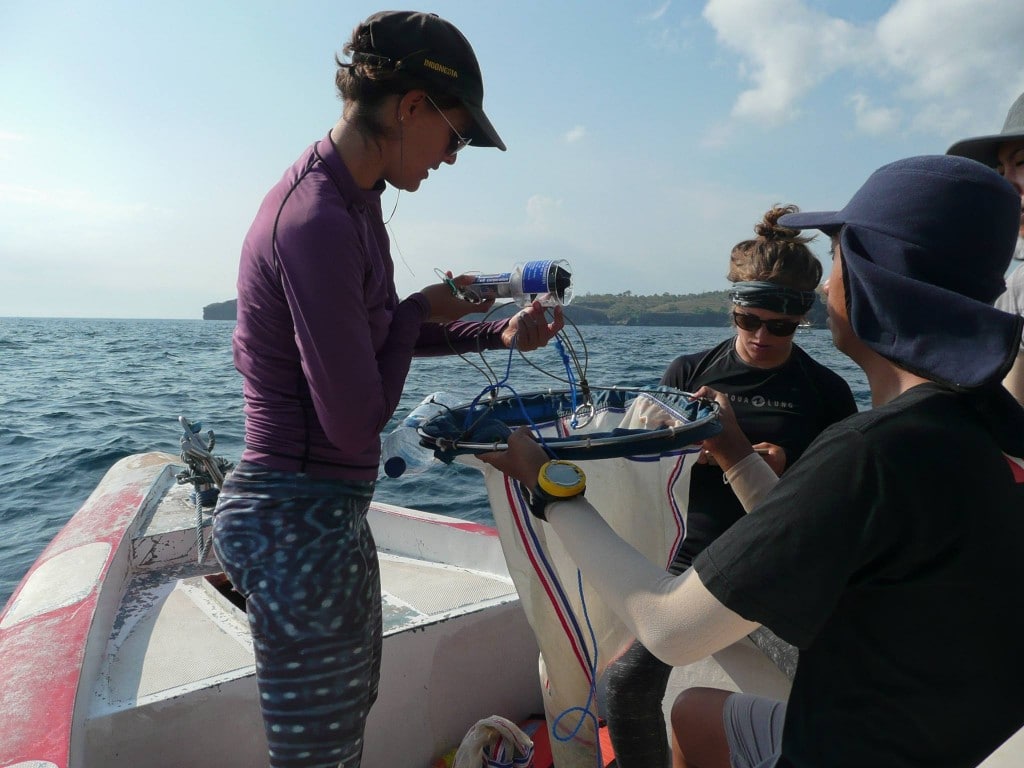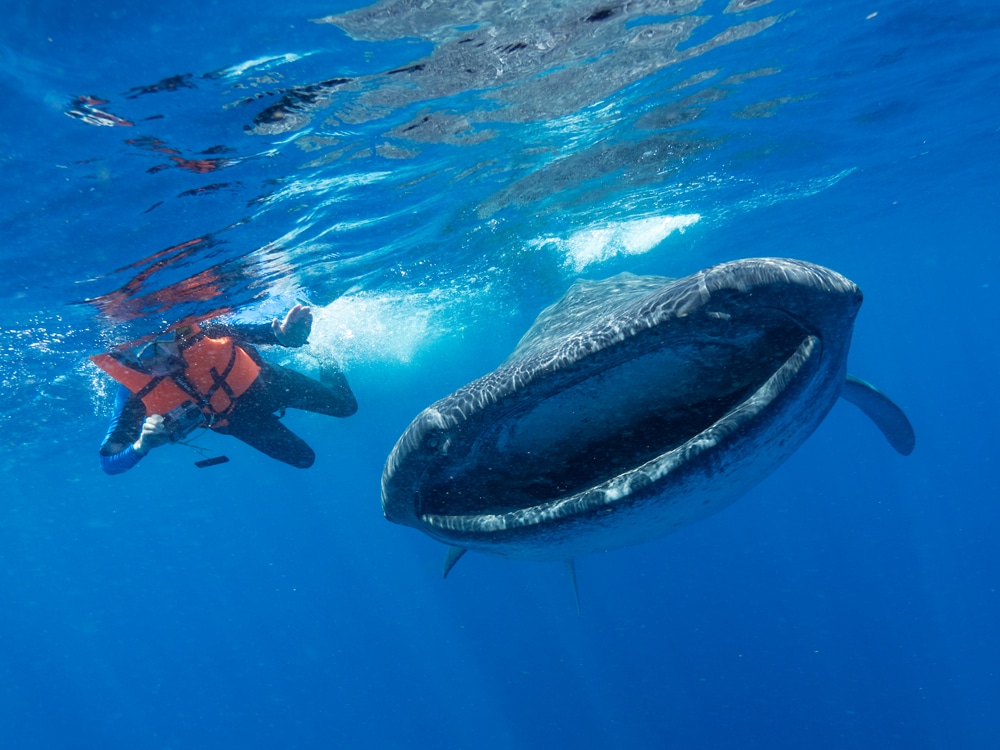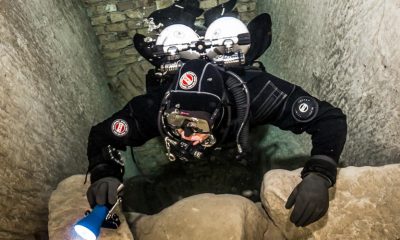News
Microplastics: No small problem for filter-feeding ocean giants
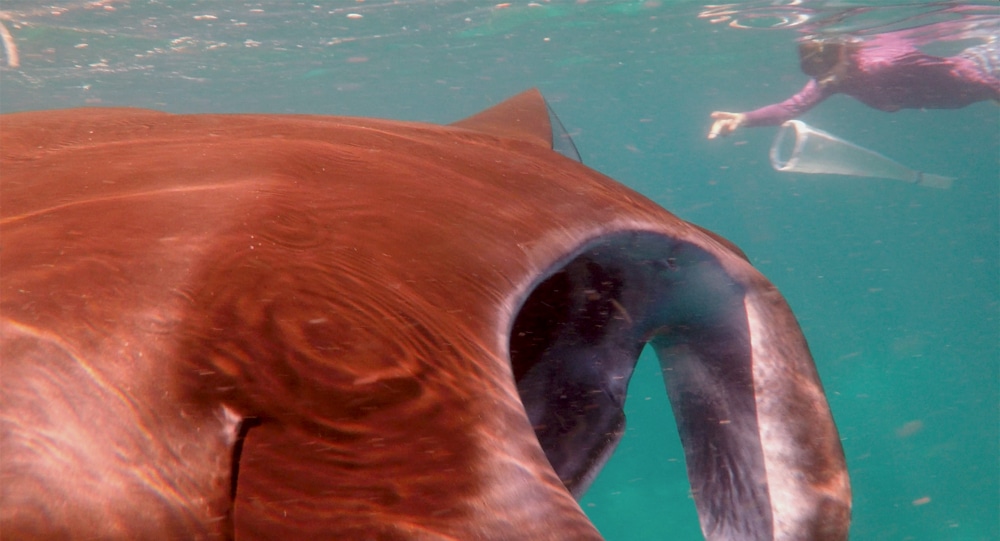
Sharks, rays and whales impacted by microplastic pollution and associated toxins
Plastic pollution has recently gained increasing attention for its effects on marine mammals, fish and birds. However, it is still not fully understood to what extent small pieces of plastic, known as microplastics, impact marine life and ecosystems. Microplastic pollution is a major threat to filter-feeding animals such as manta rays, whale sharks and baleen whales, according to a new study published in the journal Trends in Ecology & Evolution. These iconic animals are at risk of exposure to microplastic contamination and associated toxins.
The paper, authored by researchers from the Marine Megafauna Foundation, Murdoch University (Australia), University of Siena (Italy) and Hawaii Institute of Marine Biology, stresses the significant risks microplastics pose to megafauna since these need to swallow hundreds to thousands of cubic meters of water daily in effort to capture plankton. They can ingest microplastics directly from polluted water or indirectly through contaminated prey. Filtering of indigestible plastic particles can block nutrient absorption and cause damage to the digestive tract of animals. Additionally, plastic-associated chemicals and pollutants can accumulate over decades and alter biological processes, leading to altered growth, development and reproduction, including reduced fertility.
Lead author Elitza Germanov, researcher at the Marine Megafauna Foundation and PhD student at Murdoch University, said: “Despite the growing research on microplastics in the marine environment, there are only few studies that examine the effects on large filter feeders. We are still trying to understand the magnitude of the issue. It has become clear though that microplastic contamination has the potential to further reduce the population numbers of these species, many of which are long-lived and have few offspring throughout their lives.”
“It is vital to understand the effects of microplastic pollution on ocean giants since nearly half of the mobulid rays, two thirds of filter-feeding sharks and over one quarter of baleen whales are listed by the IUCN as globally threatened species and are prioritized for conservation”, she adds.
It is challenging to assess plastic concentrations through conventional methods usually used to study animal diets, such as stomach analysis or collection of egested material, as these rely on opportunistic observations and are unsuitable for threatened species. However, using non-lethal sampling of small amounts of tissue (biopsy), researchers are now able to test for chemical tracers.
Professor Maria Cristina Fossi from the University of Siena, one of the first scientists who studied this problem, and colleagues reported an average of 0.7 plastic items per cubic meter of water around the Baja California peninsula, an important feeding ground for endangered whale sharks. The researchers estimated that whale sharks may be ingesting 171 items on a daily basis. Meanwhile in the Mediterranean Sea, fin whales are thought to swallow microplastic particles in the thousands per day.
“Our studies on whale sharks in the Sea of Cortez and on fin whales in the Mediterranean Sea confirmed exposure to toxic chemicals, indicating that these filter feeders are taking up microplastics in their feeding grounds. Exposure to these plastic-associated toxins pose a major threat to the health of these animals since it can alter the hormones, which regulate the body’s growth and development, metabolism, and reproductive functions, among other things”, says Professor Fossi who co-authored this paper.
Filter feeders are considered to be at high risk of exposure since many inhabit some of the most polluted waters, namely in the Coral Triangle region, Bay of Bengal, Gulf of Mexico and Mediterranean Sea. “As plastic production is projected to increase globally, future research should focus on coastal regions where microplastic pollution overlaps with the critical feeding and breeding grounds of these threatened animals. Many areas are biodiversity hotspots and of economic importance due to fisheries and marine tourism. Targeting these with the backing of local government and industry will help ensure efforts to mitigate the plastic threat are employed to their fullest,” Germanov concludes.
Elitza Germanov, Andrea Marshall, Lars Bejder, Maria Cristina Fossi and Neil R Loneragan ‘Microplastics: No small problem for filter feeding megafauna’ was published on 5 February 2018 and is available here.
The Marine Megafauna Foundation was created in 2009 to research, protect and conserve the populations of threatened marine megafauna around the world. ‘Megafauna’ are large marine species such as sharks, rays, marine mammals and sea turtles.
Find out more about Marine Megafauna Foundation here.
News
Dive Worldwide Announces Bite-Back as its Charity of the Year

Over the next 12 months, specialist scuba holiday company Dive Worldwide will be supporting Bite-Back Shark & Marine Conservation with donations collected from client bookings to any one of its stunning dive destinations around the world. The independently-owned operator expects to raise £3000 for the UK charity.
Manager at Dive Worldwide, Phil North, said: “We’re especially excited to work with Bite-Back and support its intelligent, creative and results-driven campaigns to end the UK trade in shark products and prompt a change in attitudes to the ocean’s most maligned inhabitant.”
Bite-Back is running campaigns to hold the media to account on the way it reports shark news along with a brand new nationwide education programme. Last year the charity was credited for spearheading a UK ban on the import and export of shark fins.
Campaign director at Bite-Back, Graham Buckingham, said: “We’re enormously grateful to Dive Worldwide for choosing to support Bite-Back. The company’s commitment to conservation helps set it apart from other tour operators and we’re certain its clients admire and respect that policy. For us, the affiliation is huge and helps us look to the future with confidence we can deliver against key conservation programmes.”
To launch the fundraising initiative, Phil North presented Graham Buckingham with a cheque for £1,000.
Visit Dive Worldwide to discover its diverse range of international scuba adventures and visit Bite-Back to learn more about the charity’s campaigns.
MORE INFORMATION
Call Graham Buckingham on 07810 454 266 or email graham@bite-back.com
Gear News
Scubapro Free Octopus Promotion 2024
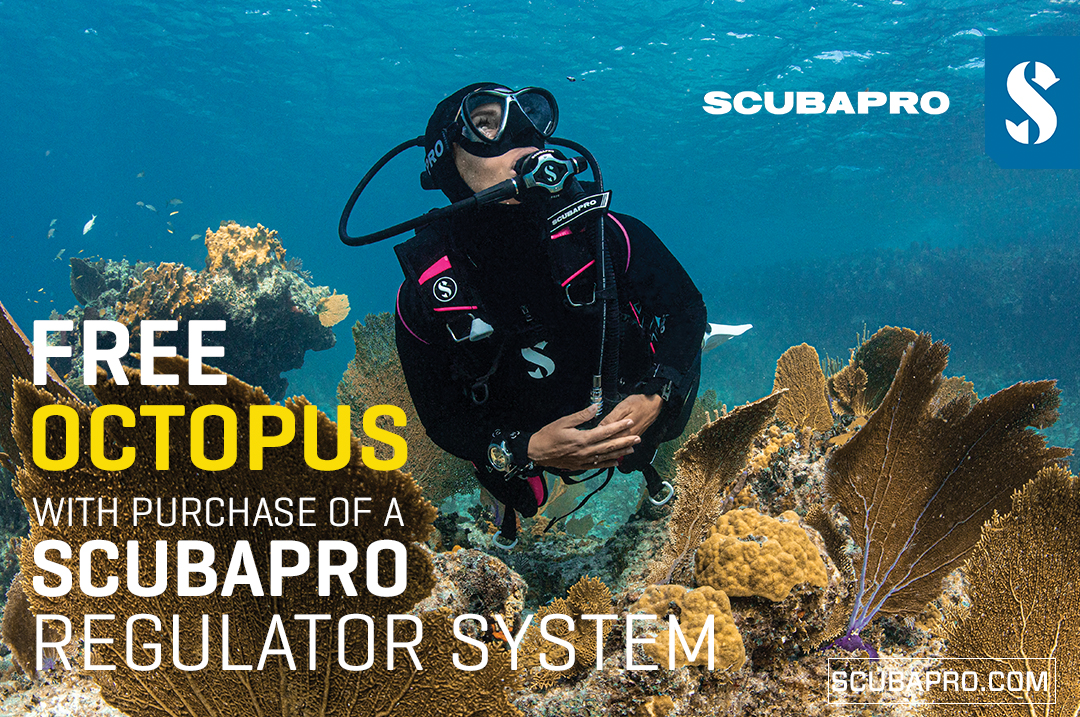
Free Octopus with every purchase of a SCUBAPRO regulator system
Just in time for the spring season, divers can save money with the FREE OCTOPUS SPRING PROMOTION! Until July 31st SCUBAPRO offers an Octopus for free
with every purchase of a regulator system!
Get a free S270 OCTOPUS with purchase of these combinations:
MK25 EVO or MK19 EVO with A700
MK25 EVO or MK19 EVO with S620Ti
MK25 EVO or MK19 EVO with D420
MK25 EVO Din mit S620Ti-X
Get a free R105 OCTOPUS with purchase of the following combinations:
MK25 EVO or MK19 EVO with G260
MK25 EVO or MK17 EVO with S600
SCUBAPRO offers a 30-year first owner warranty on all regulators, with a revision period of two years or 100 dives. All SCUBAPRO regulators are of course certified according to the new European test standard EN250-2014.
Available at participating SCUBAPRO dealers. Promotion may not be available in all regions. Find an authorized SCUBAPRO Dealer at scubapro.com.
More information available on www.scubapro.com.
-

 News3 months ago
News3 months agoHone your underwater photography skills with Alphamarine Photography at Red Sea Diving Safari in March
-

 News3 months ago
News3 months agoCapturing Critters in Lembeh Underwater Photography Workshop 2024: Event Roundup
-

 Marine Life & Conservation Blogs3 months ago
Marine Life & Conservation Blogs3 months agoCreature Feature: Swell Sharks
-

 Blogs2 months ago
Blogs2 months agoMurex Resorts: Passport to Paradise!
-

 Blogs2 months ago
Blogs2 months agoDiver Discovering Whale Skeletons Beneath Ice Judged World’s Best Underwater Photograph
-

 Marine Life & Conservation2 months ago
Marine Life & Conservation2 months agoSave the Manatee Club launches brand new webcams at Silver Springs State Park, Florida
-

 Gear Reviews3 months ago
Gear Reviews3 months agoGear Review: Oceanic+ Dive Housing for iPhone
-

 Gear Reviews2 weeks ago
Gear Reviews2 weeks agoGEAR REVIEW – Revolutionising Diving Comfort: The Sharkskin T2 Chillproof Suit


